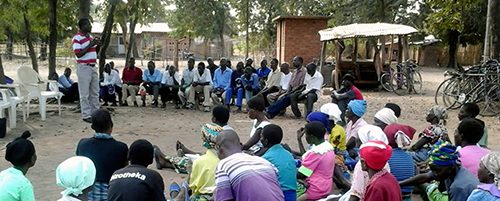
Providing technical leadership to UBALE, which means “partnership” in Chichewa, NCBA CLUSA is working to strengthen value chains, increase farmers’ access to market information and financial services, identify on and off farm employment opportunities for youth, women and vulnerable participants, and build the technical and institutional capacity of the National Smallholder Farmers’ Association of Malawi (NASFAM).
As a whole, the USAID Food for Peace (FFP)-funded UBALE program, implemented by Catholic Relief Services (CRS), works towards increasing the productivity of profitable and nutritious farm products for smallholder farming households, linking vulnerable rural households to successfully engage with markets, reducing stunting among children under five, increasing resiliency to shocks for households and communities in a cross-cutting manner, and supporting underlying systems and structures to sustainably contribute to reducing chronic malnutrition and food insecurity while building resilience.
NCBA CLUSA is responsible for the value chain and farmer association income generation portion of the project, which will target 29,000 farmers. NCBA CLUSA will work with NASFAM to organize farmer clubs into more robust marketing associations of about 1,500 farmers and provide them training in negotiation, quality and organized delivery. NCBA CLUSA, along with NASFAM, will create links between farmers associations and local, national and international buyers; commodity exchanges, agro-input suppliers; and financial service providers.
Linking to markets and key market information is an important piece for strengthening value chains, such as pigeon pea. In the past year pigeon peas from Malawi were highly valued by Indian markets because they are grown organically, but because the demand was not forecasted for farmers there was insufficient production. NCBA CLUSA will be exploring ways to build real-time market information infrastructure for pigeon pea markets in India and other countries in partnership with the Malawi Ministry of Trade and Industry.
While international markets are one piece of the assessment, to accurately assess which value chains were important to each community, UBALE staff worked with producer groups at the village level to assess crops using priority matrixes. Value chain assessments took into account the farmers’ interest, the markets, and buyer’s interests in addition to the ability of the crop to balance the needs of income and nutrition at the household level, promote the diversification of production systems, and promote equity of income for women. Meetings were held in nine intervention areas in the districts of Nsanje, Chikwawa and Blantyre Rural, which identified pigeon pea, groundnuts and sesame as three key value chains for intervention.
The CRS-led UBALE program, funded by USAID, marks NCBA CLUSA’s first time working in Malawi. The project will run through September 2019 and will benefit approximately 250,000 vulnerable households in the areas of health, nutrition and improved livelihoods. NCBA CLUSA is responsible for the value chain and farmer association income generation portion of the project.


